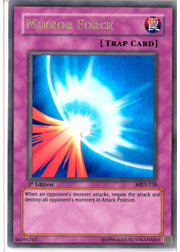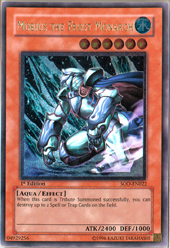Every now and then, I notice certain TCG terms start getting a lot of focus and discussion. For instance, we’ve all heard the phrase “card advantage” thrown around all over the place for quite a while now, and everyone seems to have an opinion on it. But lately, I’ve heard a lot of people talking about “over-extension” without really showing a good grasp of the term, so I’m going to take a shot at explaining the concept a little more clearly in my article this week.
Here’s a convenient definition that will start us all off on the same page!
Over-extension is a commitment to the field that overtakes the opponent’s commitment by a significant (albeit mathematically variable) amount.
In practical terms, let’s say that you have three cards on the field. Suppose I have three cards on the field, too. Suddenly, I play three more cards to the field in an effort to take control of the game or claim victory. In this situation, I’ve made an over-extension.
I want to stress that there’s nothing negative implied in either the definition or the example. Read over a forum or listen to a group of players at an event and you’ll often hear something like, “Oh, well, that deck tends to over-extend,” in a derogatory context. Over-extension is a natural and necessary part of the game: there’s nothing necessarily negative or positive about it.
 Can an over-extension result in a loss? Sure it can! Over-extend with monsters and run straight into Mirror Force, and you’ve just expended a lot of resources for nothing. On the other hand, if you fill up your field with special summons and slam them all into an opponent holding on by 3000 life points who is desperately hoping you’ll fall for the set Nobleman of Crossout bluff, you’re going to win the game. Some decks and players avoid it, others embrace it. It works both ways. Here’s a hypothetical duel scenario to show you precisely what I mean.
Can an over-extension result in a loss? Sure it can! Over-extend with monsters and run straight into Mirror Force, and you’ve just expended a lot of resources for nothing. On the other hand, if you fill up your field with special summons and slam them all into an opponent holding on by 3000 life points who is desperately hoping you’ll fall for the set Nobleman of Crossout bluff, you’re going to win the game. Some decks and players avoid it, others embrace it. It works both ways. Here’s a hypothetical duel scenario to show you precisely what I mean.
Ted and Amy have each been striving for card advantage across several turns, until they’ve reached the mid-game. Ted decides that he has a chance to take control of the game, and decides to commit several more cards to the field than Amy. He’s certainly running a risk here. Cards like Torrential Tribute, Heavy Storm, or even solid “outplaying” from Amy can result in sorry consequences for Ted. On the other hand, the gambit could be successful, and Ted could totally overwhelm Amy to claim victory (or at least definitive control of the game). Which will it be? How well have Ted and Amy analyzed each other’s game? You’ve all seen it happen, and it makes for an exciting duel.
Anyway, let’s say that Ted decides to commit an over-extension, but he can’t work it to achieve a win or to gain definitive control of the duel. Because of this, Amy will now have several advantages.
First, in this game of incomplete information, Amy should have learned a great deal about Ted’s remaining cards. Face-up monsters and activated spells and traps have been revealed. Amy knows that set cards are either monsters, or spells and traps. Ted’s graveyard is there for perusal, and Amy can determine how many cards remain in Ted’s hand. If Amy is attentive, she can evaluate Ted’s options and predict his moves with much greater ease.
Second, Ted has now committed cards to the field, where they can be destroyed or removed from the game. That can equal card advantage for Amy if the over-extension was reckless, or if Amy is holding the right cards to take Ted apart. This is exactly the type of risk that leads many players to incorrectly assume that over-extension is always a bad move. A weak monster is relatively safe in the hand, but once it hits the field, its position becomes insecure. If a player brings that monster to the field as part of an over-extension, he or she gives the opponent an opportunity to claim an advantage.
However, that opportunity isn’t necessarily being presented on a silver playmat. Here’s one way that it could go down. You’ve got one set spell or trap card, and a face up D. D. Assailant. Your opponent has a set spell or trap card as well, along with one set monster. Your opponent surveys the field, glances at her hand, and decides to go for it and over-extend. She flip summons her set monster, revealing Mystic Tomato. This card has not been added to the field—it was there already, so it can’t be counted toward cards that are contributing to her over-extension in a technical sense. But it is going to help her try to control the game.
 She follows up the flip summon by using Premature Burial to special summon . You’ve got no response, so she plays Book of Moon to turn your Assailant face down, and then normal summons Mystic Swordsman LV2 from her hand. She’s going to take out that Assailant with Mystic Swordsman LV2, and then attack you directly with Mobius and the Tomato for a total of 3800 damage. If she’s successful, it’s really going to hurt.
She follows up the flip summon by using Premature Burial to special summon . You’ve got no response, so she plays Book of Moon to turn your Assailant face down, and then normal summons Mystic Swordsman LV2 from her hand. She’s going to take out that Assailant with Mystic Swordsman LV2, and then attack you directly with Mobius and the Tomato for a total of 3800 damage. If she’s successful, it’s really going to hurt.
Now, if your set spell or trap can block one of those attacks (say you’ve got Sakuretsu Armor lurking there) you’re going to check the impact of her over-extension. Then on your next turn, you could attack that vulnerable Mystic Swordsman LV2, claiming card advantage and generating momentum of your own. If your set card is merely Card Destruction doing its best to look intimidating, though, you’re going to have your work cut out for you to recover from her assault. And if your opponent had over-extended even more, say by setting a Sakuretsu Armor of her own, she could repel your follow-up attack on Mystic Swordsman LV2. But at the same time, she’d become far more vulnerable to the likes of Heavy Storm.
There’s a potential for both risk and payoff in this kind of play. Intelligent over-extensions require careful decision-making to keep the risk as low as possible, and quick thinking to take advantage of gaps in the opponent’s defenses, not to mention the ability to work your way out of the hole if it all goes awry.
The ideal duel often involves both players taking a chance and over-extending, with neither over-extension winning the game. When both players have over-extended, they often fall back to topdecking. Many classic duels feature a failed over-extension on either side and then a frantic race to rebuild and claim the win. To many players, this is the essence of the Yu-Gi-Oh! TCG: taking a chance, committing resources, and judging risk in order to try to pull off a win before the opponent.
Note that even if you adhere to card advantage as your main method of controlling a duel, once you have that advantage, you’re probably going to make a bigger commitment to the field than your opponent in order to capitalize on it. Cards do tend to have more of an impact on the game once they hit the field, after all. Yu-Gi-Oh! is unique among most TCGs, because it runs on a mostly costless game engine, which makes over-extension a fact of the metagame. Virtually no other TCG offers you the opportunity to bomb your whole hand onto the table in an overwhelming effort to claim a thrilling victory, to the delight of spectators everywhere.
If you want to understand your own play style better, learn to identify an over-extension when you’re making one, and recognize the opportunities to make a smart one. Analyzing these situations can often help determine why you lost a particular duel. An over-extension that goes awry can cost you card advantage, tempo control, and momentum. At the same time, if you don’t press an advantage when the opportunity arises, it can cause control of the duel to slip from your fingers. Experience will help you judge when to commit more of your resources to the field for the minimum risk and maximum payoff—as long as you remember that over-extension isn’t always a bad move.